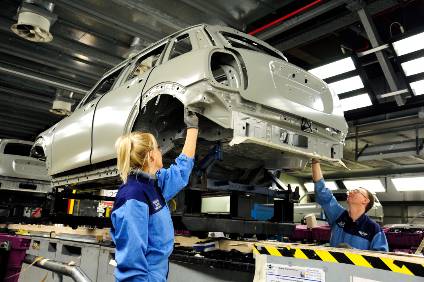
Data released by the SMMT shows that car output fell 20% during the first half of the year as the UK automotive trade body also warned that the industry is incurring substantial Brexit mitigation costs ahead of the UK’s planned departure from the EU trade bloc on October 31st.
UK car production was down 15.2% in the month of June, marking the 13th consecutive month of negative growth.

Discover B2B Marketing That Performs
Combine business intelligence and editorial excellence to reach engaged professionals across 36 leading media platforms.
In the first six months of the year 666,521 cars rolled off British production lines, a year-on-year loss of 168,052 units due largely to falling demand in key markets, including the UK, exacerbated by factory shutdowns in April pulled forward in anticipation of the March Brexit deadline (which passed with planned withdrawal put back – the planned date for the UK’s departure from the EU trade bloc is now October 31st).
In June, output for the UK rose by 2,791 units following an ‘anomalous’ 47.2% decline in the same month last year when preparation for the new WLTP emissions test impacted volumes. The underlying trend, however, remains downward, with year-to-date production for the domestic market down 16.4%.
Meanwhile, the number of cars built for export fell by 19.8% in June and by 21.0% in the first half of the year, with just over half a million units shipped overseas given softening of key overseas markets and global trade tensions. Exports to the sector’s top global markets fell by double digits, with the US down 12.9%, China down by 53.1%, Japan down 10.5% and Turkey down by 93%.
Demand in the UK’s biggest market, the EU, also fell, by 15.6%. However, the SMMT noted that the EU still accounts for 57% of all UK car exports – the highest first half dependence since 2016.
Brexit ‘cliff-edge’ mitigation preparation
The news comes as new SMMT research reveals the substantial cost to industry of ‘no deal’ Brexit preparations. At least GBP330m has already been spent by the sector on contingency plans, the SMMT said. Most major UK manufacturers have tied up working capital stockpiling materials and components, securing warehousing capacity and investing in new logistics solutions, additional insurance and training in new customs procedures. Significantly, many manufacturers have moved annual plant shutdowns from the summer to April, a measure which cannot be repeated for the proposed October departure date, the SMMT maintains.
Meanwhile, latest figures show inward investment into the sector effectively stopped in the first half of the year. In the period January-June, newly pledged investment was down more than 70% to GBP90m, contrasting with the average annual investment figure of GBP2.7bn over the previous seven years.
The SMMT noted that while the announcement by Jaguar Land Rover (JLR) earlier this month was exceptional good news, this is something of an outlier as the vast majority of manufacturers have suspended plant and product spending in the UK amid ongoing uncertainty.
Mike Hawes, SMMT Chief Executive, said: “Today’s figures are the result of global instability compounded by ongoing fear of ‘no deal’. This fear is causing investment to stall, as hundreds of millions of pounds are diverted to Brexit cliff-edge mitigation – money that would be better spent tackling technological and environmental challenges.
“The industry’s foundations are fundamentally strong, however, and we’re ready to work with the new government to build on these through the industrial strategy. We need an internationally competitive business environment to encourage more investment, more innovation and more growth. That starts with an ambitious Brexit deal that maintains frictionless trade and we look to the new administration to get a deal done quickly so manufacturers can get back to the business of building cars and helping deliver a brighter future for Britain.”
The SMMT said that a ‘no deal’ Brexit would mean the immediate imposition of tariffs costing some GBP4.5bn a year and an end to the seamless movement of goods. It said any potential disruption at the border would throw Just-in-Time (JIT) manufacturing into ‘chaos, undermining the sector’s competitiveness and putting profitability and jobs at risk’.
Stuart Apperley, director and head of UK automotive at Lloyds Bank Commercial Banking, said: “A 13th straight month of production declines will further knock the industry’s confidence.
“While carmakers were under no illusions that the industry had turned a corner, announcements like those from Jaguar Land Rover that it will be building the new electric XJ at its Castle Bromwich plant offer small glimmers of light.
“But the same old problems – from potential disruptions to trade relationships, falling sales of electric vehicles and China’s steep decline in demand – will be keeping carmakers awake at night. The next few months will likely play a key role in revealing the longer-term fate of the industry.”






